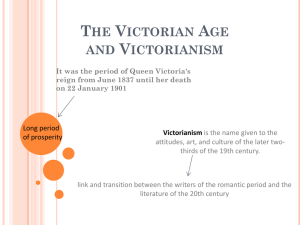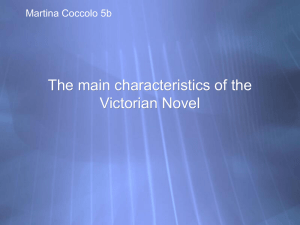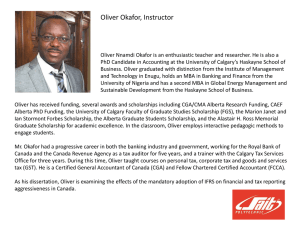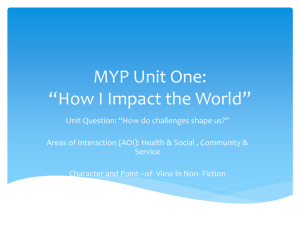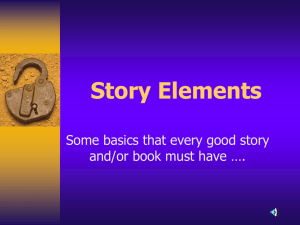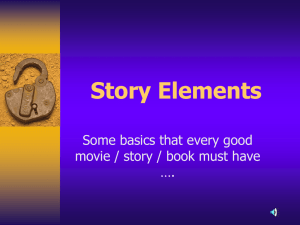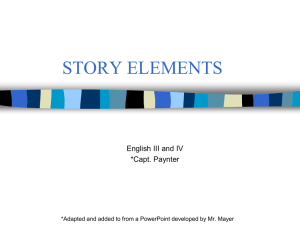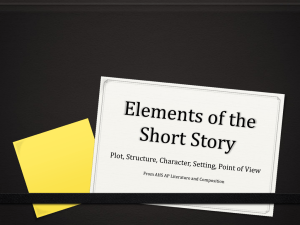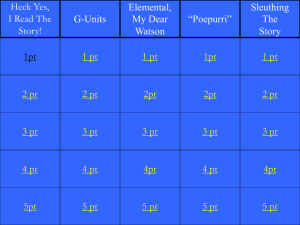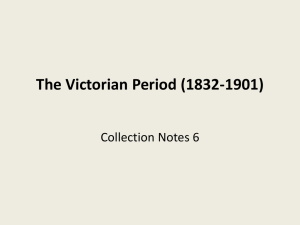The Victorian Age & Charles Dickens` Novels Del Sal Beatrice
advertisement
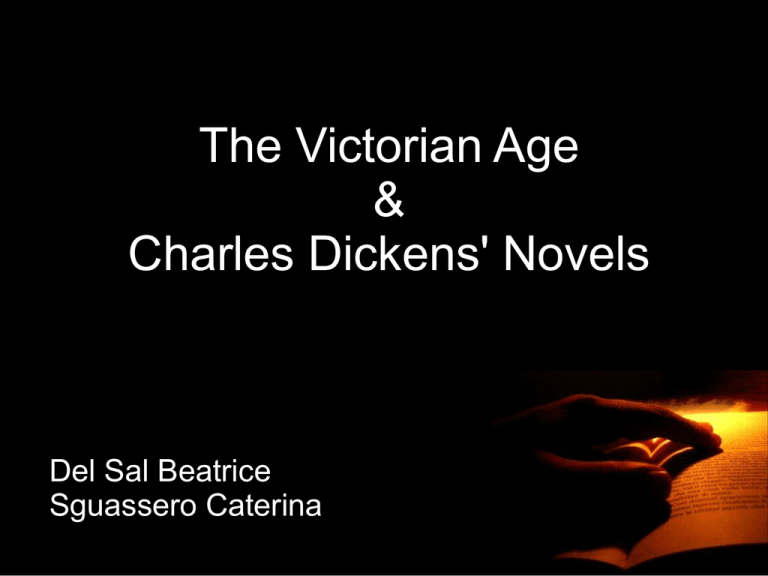
The Victorian Age & Charles Dickens' Novels Del Sal Beatrice Sguassero Caterina The Victorian Age I When? During the reign of Queen Victoria of England (1837-1901) What? Policy of “isolationism” from European affairs, after the Congress of Vienna (1815); Queen Victoria established a constitutional monarchy, government alternation between Tory (Conservative) and Whig (Liberal); Colonialism and imperialism The imperial myth, associated with a cultural form of Darwinism, especially in India and the Dark Continent (1899, The Boer War, British vs. Dutch farmers to secure rights for British citizens); Decolonisation: transformation from colonies into dominions (selfgoverning), for example Canada and Australia; The Victorian Age II “The Age of Machinery” = technological improvements = industrialisation; Urbanisation Economic Boom (great wealth for the ruling class), UK became the world centre for industry, Commerce and banking; Liberalism and laissez-affair policy (harsh working conditions in factories and the discontent of poor classes was voiced in 1838 by the Chartists); Competition between UK, USA and Germany; Class system revolution: the aristocracy, the middle class and the working class. Ideals: Consumerism and Utilitarianism, Puritanism and Darwinism. Victorian Novel Victorian values: Themes: •Puritanism •Clash between classes •Utilitarism •Middle class family life •Darwinism The readers identify partly: Use of the • Grotesque To teach • Pathetic To have fun They gave to the middle class an “alibi” and a way of exorcising all the ghosts of the middle classes’ bad conscience. Publishing Literacy increased, thanks to a law of compulsory education (1870, The Education Act) Spread of newspapers, magazines, reviews and, especially of fictions and novels in instalments. Charles Dickens (1812-1870) Dickens was the most successful of the English Victorian novelists, a master of sentiment and a militant reformer. We are going to analyse some extracts taken from: Oliver Twist Nicholas Nickleby Hard Times, Book The First, Chapter 4, Mr Bounderby http://www.marilenabeltramini.it/schoolwork0708/materiali5c/MrBounderby.pdf Titles OLIVER TWIST/NICHOLAS NICKLEBY Both the titles are proper names in order to focus the reader’s attention on the character and his story. The reader only know that the novel may be about the life and vicissitudes of the protagonist, that is a boy. The surname “twist” suggested also an idea of complicated, difficult, hard and unespected changes of direction of the storyline. HARD TIMES, MR BOUNDERBY. The title of the novel recalls the difficulties that people had to face during the Victorian Age. If you consider the name Bounderby, you will see that bound means “a limitation or restriction” or “a leaping movement towards or over something”. Thus it recalls someone who imposes himself or prevaricates someone else. Story lines Oliver Twist The extract provides an episode in an English workhouse: the protagonist, Oliver, asks for more meal after having dinner. Nicholas Nickleby The extract tells about a lesson in an English school for poor children: the teacher's method reveals the middle class' exploitation of the poor. Hard Times, Mr Bounderby. The extract provides the characterization of a typical self-made man, who belonged to the Middle Class. Settings Oliver Twist: English workhouse Nicholas Nickleby: English school for poor children Hard Times, Mr Bounderby: “In the formal drawing-room of Stone Lodge”. Characterizations Oliver Twist: Children are described usiings ad images about their hunger, underlined by the alliteration suffered,slow starvation, and the image of the cannibal children and to the antithesis long grace - short commons. The master is characterized with grotesque features: his great body mass, his authoritarian attitude (exaggerated lexical choice to render his dress), his reaction (theatral). He seems to be an authority - and he also feels like that - but he actually depends on other men; to convey the idea of his superior position he is juxtaposed to the children (fat - small) and to the servants. Nicholas Nickleby: Children's characterization is built on pathos and concerns their attitude in the classroom. The narrator emphasizes the children's miserable condition describing how they behave: silence, quiet, absence of movement, tiredness, sadness, subdued position. The metaphor scarecrows underlines they look like humans, but they are treated like objects. The narrator puts the focus also on theyr food and hangry: the simile like diluted pincushions and the metaphor a minute wedge convey the image of very poor and disgusting meal. Poor children are compared to Mr Squeers' son, who is joyful, strong and feels superior to them. Mr Squeers:His characterization includes the way he teaches and how he looks: he shows a all-knowing expression, but it is not accompanied by a reflection over the children's mood; his culture concerns only scholarship while it doesn't include the ability to understand the surrounding world, so it is superficially and limited Hard Times, Mr Bounderby. Personality->devoid of sentiment is a narrator's judgement that underlines his tendency to materiality and richness; egocentric, vain,sense of superiority and supremacy, self-confidential, arrogant; Economic-social status-> economic frenzy and excessive aspiration; Laughter-> brassy; Physical description-> recalls his arrogance and bossy behaviour; concerned his face (great puffed, swelled, strained); Culture-> concerns only scholarship, it does not include the ability of investigating the surrounding world; Childhood-> poor condition, exaggeration of his misery and health Narrative techniques Oliver Twist The third person narrator is omniscient and intrusive because he reveals characters' thoughts and filters description with connotative devices. The scene is described with exaggerated and comic features that provoke laughter and weaken the tragic element. The narrative tecniques used are the grotesque and the pathetic. The grotesque is exploited in characterizing the masters and hyperbole is used in referring to the children: the decision they take in group is associated to a council, that emphasizes their great desire to change situation but also their naive optimism that attributes themselves more power than they actually have. Nicholas Nickleby The third person omniscient intrusive narrator emphasizes the children's poverty and uses exaggeration to describe Mr Squeers and pathos to the children; the novelist ridicules mr squeers’s sense of superiority , he wants authority, an excessive aspiration. The first explanations reveal the teacher's ignorance, it is only a front without substance, a way to acquire a positive mask in front of Nicholas. In the second part the narrator doesn't reveal Nicholas' thoughts but only Mr Squeers' one: he doesn't know what Nicholas is thinking about him, maybe he fears criticism. The narrator uses phatos and grotesque in order to let the reader to have fun or to feel piety. Hard Times, Mr Bounderby Narrative Techniques: third person omniscient narrator, showing and telling, use of dialogue (Mr Bounderby vaunts himself), use of grotesque and pathos, conveyed through the exaggerations made in his physical description, personality and childhood and through the use of language of sense impressions, which appeals to sight and hearing Reader's Position. Oliver Twist/Nicholas Nickleby They can be interpreted and judged differently according to one’s mentality: a reader from lower classes would agree with the narrator and one similar to the characters that represent the upper classes would find them too evil or exploiter than them. Hard Times, Mr Bounderby The extract concerns the description of a typical Middle Class man, who thinks only about money, who wants to be first in everything and, especially, who wants to prevaricate and subdue the other people. The reader can identify himself in the novel, both from the point of view of Mr Bounderby and from the one of his submitted, but at the same time the reader enjoys the novel because of the use of emphasis, grotesque and pathos, that make the reader laugh. Themes & Messages Dickens maintained that industrialisation provokes the loss of human nature. Oliver Twist/Nicholas Nickleby The main theme is represented by the clash between classes, the condition of poor children and exploitation. Hard Times, Mr Bounderby. The novel describes and criticizes the social and economic conditions of contemporary England. It represents the typical Middle Class man, who strongly believes in industrialisation, utilitarianism and materialism, in his potentiality and skilfulness. The writer wants to condemn that kind of “self-made man” because of his vices: money and power. He is totally engaged in his activity, thus he seems to lack humanity and to be a machine. The Anti-Victorian Reaction and Jude the Obscure Jude the Obscure is a pessimistic and controversial novel written by Thomas Hardly in 1895. Its hero, Jude Fawley, is a working-class young man who dreams of becoming a scholar. The other main character is his cousin, Sue Bridehead, who is also his central love interest. Themes include class, scholarship, religion, marriage, and the modernisation of thought and society. It is an Anti-Victorian novel, because the writer criticizes revered institutions of the Victorian Age and social conventions: Marriage; Christianity and religion; bourgeois values associated with marriage; fixed class boundaries. T. Hardly was influenced by Schopenhauer philosophy: the immanent will exists and does not take care of the human being. http://www.marilenabeltramini.it/schoolwork1011/UserFiles/Admin_teacher/donne_because_.pdf The extract provides a picture of a family tragedy, through a cinematic effect and the language of sense impression. Little Jude, the bigger of Jude and Sue's children, suffers because of their poverty and because his mother is pregnant again, but they have no money: he murders his brothers and commits suicide by hanging.
